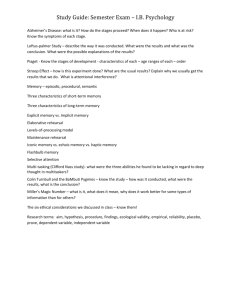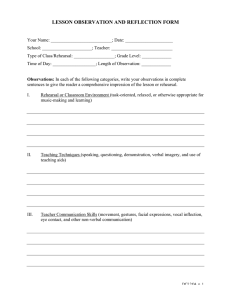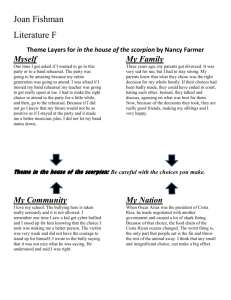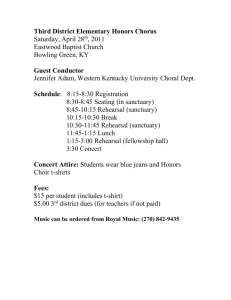Rehearsal Guidelines For Actors And Directors Last updated: 5/2015
advertisement
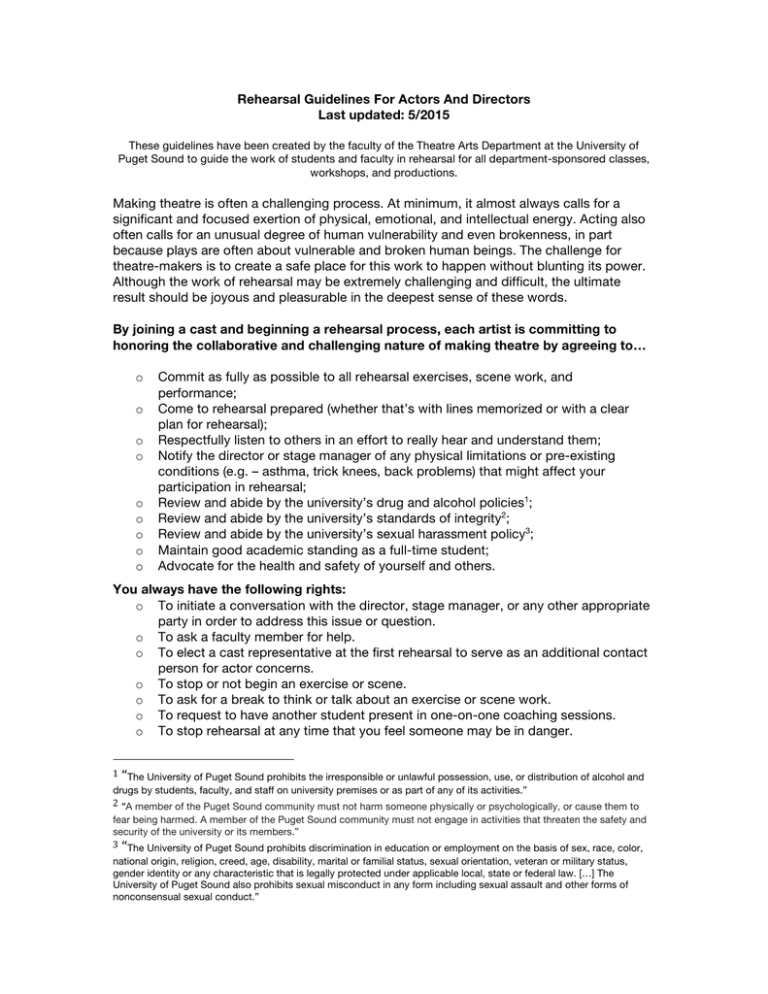
Rehearsal Guidelines For Actors And Directors Last updated: 5/2015 These guidelines have been created by the faculty of the Theatre Arts Department at the University of Puget Sound to guide the work of students and faculty in rehearsal for all department-sponsored classes, workshops, and productions. Making theatre is often a challenging process. At minimum, it almost always calls for a significant and focused exertion of physical, emotional, and intellectual energy. Acting also often calls for an unusual degree of human vulnerability and even brokenness, in part because plays are often about vulnerable and broken human beings. The challenge for theatre-makers is to create a safe place for this work to happen without blunting its power. Although the work of rehearsal may be extremely challenging and difficult, the ultimate result should be joyous and pleasurable in the deepest sense of these words. By joining a cast and beginning a rehearsal process, each artist is committing to honoring the collaborative and challenging nature of making theatre by agreeing to… o o o o o o o o o Commit as fully as possible to all rehearsal exercises, scene work, and performance; Come to rehearsal prepared (whether that’s with lines memorized or with a clear plan for rehearsal); Respectfully listen to others in an effort to really hear and understand them; Notify the director or stage manager of any physical limitations or pre-existing conditions (e.g. – asthma, trick knees, back problems) that might affect your participation in rehearsal; Review and abide by the university’s drug and alcohol policies1; Review and abide by the university’s standards of integrity2; Review and abide by the university’s sexual harassment policy3; Maintain good academic standing as a full-time student; Advocate for the health and safety of yourself and others. You always have the following rights: o To initiate a conversation with the director, stage manager, or any other appropriate party in order to address this issue or question. o To ask a faculty member for help. o To elect a cast representative at the first rehearsal to serve as an additional contact person for actor concerns. o To stop or not begin an exercise or scene. o To ask for a break to think or talk about an exercise or scene work. o To request to have another student present in one-on-one coaching sessions. o To stop rehearsal at any time that you feel someone may be in danger. 1 “The University of Puget Sound prohibits the irresponsible or unlawful possession, use, or distribution of alcohol and drugs by students, faculty, and staff on university premises or as part of any of its activities.” 2 “A member of the Puget Sound community must not harm someone physically or psychologically, or cause them to fear being harmed. A member of the Puget Sound community must not engage in activities that threaten the safety and security of the university or its members.” 3 “The University of Puget Sound prohibits discrimination in education or employment on the basis of sex, race, color, national origin, religion, creed, age, disability, marital or familial status, sexual orientation, veteran or military status, gender identity or any characteristic that is legally protected under applicable local, state or federal law. […] The University of Puget Sound also prohibits sexual misconduct in any form including sexual assault and other forms of nonconsensual sexual conduct.” Does this have a place in a rehearsal room? YES o o o o o o o o o o o o o o o o o Intensive physical, vocal, emotional, and mental work Intensive reflection and dialogue Action-based exercises Energy releasing exercises and games Emotional and sensory memory work Improvisation Trust exercises Storytelling Singing and other vocal exercises Physical contact Face touching and massage: head and neck; arms and hands; legs and feet; upper body Deep breathing and meditation that may produce a mild, trance-like state Rhythm, concentration, and coordination exercises Physical work that may involve jumping, pushing, pulling, running, etc. Listening Open communication Respect NO o Use of nudity as a general rehearsal technique, other than as called for by a scene in a script and only then with careful pre-discussion and agreement. o Use of sexually intimate touching as a general rehearsal technique, other than as called for in the script and only then with careful prediscussion and agreement. o Use of hitting or slapping as a rehearsal technique, other than as called for by a scene in a script and only then with careful prediscussion/agreement and the help of a fight choreographer as necessary. o Rehearsal or performance work involving weaponry of any kind without advance approval by the Director of Theatre Production. o Disrespect for collaborators
